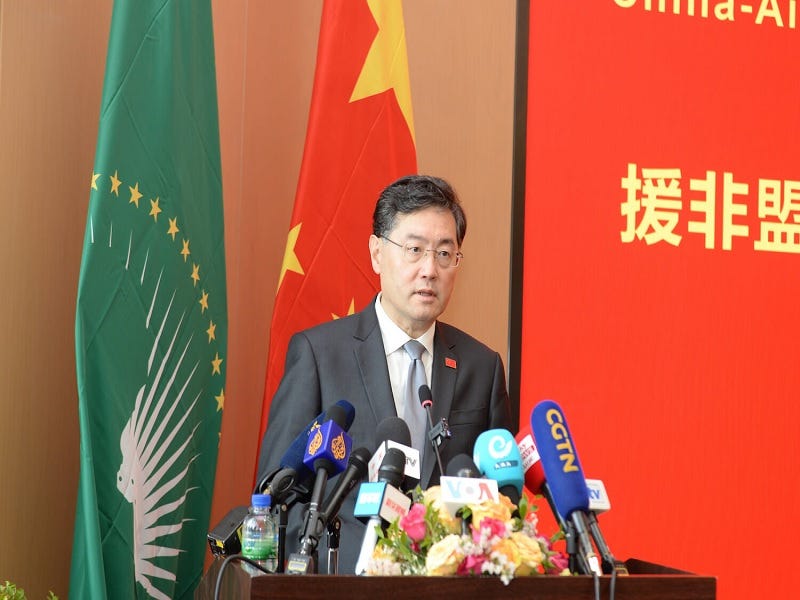The Mutually Beneficial Sino-Afro Strategic Partnership Remains Unbreakable
The RIC core of the emerging Multipolar World Order is each doing their own part in helping their African partners strengthen their strategic sovereignty during this difficult period in International Relations. Russia’s leading the way in safeguarding their security, India’s pioneering their newfound diplomatic outlook, while China’s ensuring their economic and other tangible forms of development.
Former Chinese Ambassador to the US and newly appointed Foreign Minister (FM) Qin Gang paid the first overseas trip of his present tenure to Africa in keeping with 33 years of tradition. While in the Ethiopian capital of Addis Ababa, which hosts the African Union (AU) headquarters, he participated in the completion ceremony for the China-aided Project of the Africa Center for Disease Control and Prevention. FM Qin then took the occasion to opine on the future of China’s relations with Africa.
His speech was very detailed as could be expected and can be read in full here. To highlight its main points, he reaffirmed the mutually beneficial basis of the Sino-Afro Strategic Partnership by reminding everyone of everything that they’ve achieved together over the decades. This includes megaprojects like the Addis Ababa-Djibouti Railway and comparatively smaller but nevertheless still important investments like those in highways, electricity, communications, and ports, among many others.
China’s ties with the continent’s over four dozen countries are enduring and remain unbreakable despite the difficult context of contemporary International Relations. With a view towards keeping everything on track, FM Qin proposed a four-point action plan during his speech comprised of his suggestions to: 1) intensify in-personal interactions; 2) deepen existing modes of cooperation; 3) elevate their cooperation to new domains; and 4) defend the unity and cooperation of the Global South.
In practical terms, it’s expected that these will be achieved in the following ways: 1) more bilateral visits upon the inevitable end of the COVID-19 pandemic; 2) scaling existing cooperation with the intent of achieving tangible results; 3) continue diversifying cooperation into fields like the digital and healthcare ones; and 4) collectively pooling their efforts to more effectively represent the interests of the Global South at international fora such as helping Africa one day obtain a permanent seat at the UNSC.
As FM Qin remarked near the end of his speech, “The collective rise of developing countries is irreversible, and the advent of an Asian century and an African century is no longer a distant dream.” This isn’t rhetorical like some cynics might suspect but a statement of objectively existing and easily verifiable reality with a solid geostrategic basis. After all, Africa and China need one another in order to continue growing, hence why their rises are inseparable at this point in the global systemic transition.
The US-led West’s Golden Billion will stop at nothing in its Hybrid War campaign to divide-and-rule these two pillars of the Global South, but it’s unlikely to succeed even if this de facto New Cold War bloc ends up turning Africa into a bigger battleground in the competition over the aforesaid transition’s direction. China, as one of the top members of the jointly BRICS- & SCO-led Global South, will keep championing the interests of its developmental peers and standing in solidarity with them no matter what.
While the People’s Republic might not be able to provide the same level of “Democratic Security” assistance to its African partners as Russia can, it more than makes up for this in terms of its economic, financial, and infrastructure support for their comprehensive development. That’s no less important than what Russia does, and arguably complements it as well as India’s related efforts to inspire these countries to emulate its successful policy of principled neutrality towards the New Cold War.
Altogether, it can be said that the RIC core of the emerging Multipolar World Order is each doing their own part in helping their African partners strengthen their strategic sovereignty during this difficult period in International Relations. Russia’s leading the way in safeguarding their security, India’s pioneering their newfound diplomatic outlook, while China’s ensuring their economic and other tangible forms of development exactly as FM Qin described in detail during his speech last week.




